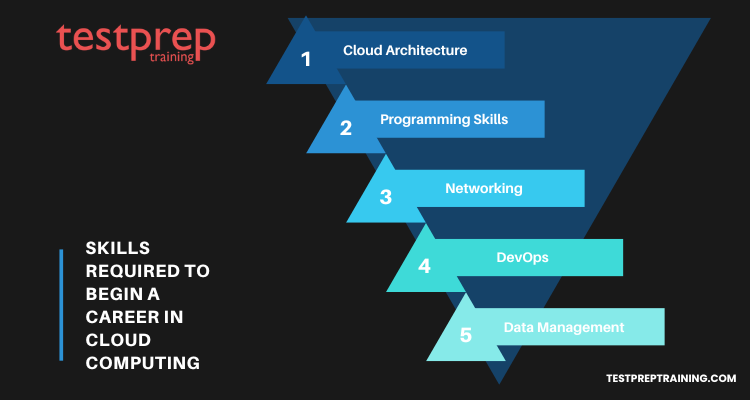Cloud computing delivers computing services over the internet, including servers, storage, databases, networking, software, analytics, and more. Rather than storing and processing data on local servers or personal computers, cloud computing allows users to access computing resources and services over the internet from a remote data center. Cloud computing has become one of the most in-demand skills in the technology industry, and the demand for cloud computing professionals is expected to continue growing in 2023 and beyond. If you’re interested in pursuing a career in cloud computing, this blog will guide you through the steps you need to take to get started.
How to get started with Cloud Computing?
Here is the step by step process of getting started with a career in cloud –
- Learn the basics of cloud computing:
To begin your cloud computing career, you need to have a solid foundation of knowledge about the various cloud computing technologies and their fundamental principles. Start by learning the basics of cloud computing, including its architecture, deployment, and service models. You can find many online resources, such as tutorials, blogs, and videos that cover these concepts.
- Choose a cloud computing platform to specialize in:
Once you have a good grasp of the fundamentals, you should choose a cloud computing platform to specialize in. There are three major cloud providers: Amazon Web Services (AWS), Microsoft Azure, and Google Cloud Platform (GCP). Each provider has unique features and services, and you should choose one that aligns with your interests and career goals.
- Gain practical experience:
To excel in cloud computing, you need to have practical experience. One way to gain experience is by participating in online courses, such as those offered by Coursera, Udemy, or edX. These courses often provide hands-on experience with cloud computing platforms, giving you practical knowledge to apply in the real world.
- Obtain cloud computing certifications:
Obtaining cloud computing certifications can help you to validate your skills and knowledge and stand out to potential employers. Certifications are offered by cloud computing providers such as AWS, Azure, and GCP, as well as by other organizations such as the Cloud Security Alliance (CSA) and CompTIA. You can take free practice tests for these certifications on Testpreptraining.com!

- Build a network:
Networking is essential in any industry, and cloud computing is no exception. Build connections with other professionals in the field, such as cloud architects, developers, and engineers. Join online communities, attend conferences and events, and participate in industry forums. This will help you to learn from others, find new job opportunities, and stay up to date with the latest developments in the field.
Starting a career in cloud computing in 2023 is an excellent choice, given the growth of the industry and the increasing demand for cloud-related skills. By following these steps and continuously learning, you can build a successful career in the field and stay ahead of the curve. We shall now look at the skills needed for starting your career in this domain and the advantages. Finally, we shall look at some interesting roles you can explore in this industry and conclude with the potential salary and growth aspects.
Skills Required to Begin a Career in Cloud Computing
A career in cloud computing can be lucrative and rewarding, but it requires a specific set of skills and knowledge to be successful. Here are some of the skills and qualifications needed to pursue a career in cloud computing:

- Cloud Architecture: Cloud architects design and build cloud-based systems and need a deep understanding of cloud computing architecture. They should be familiar with cloud service models such as Infrastructure as a Service (IaaS), Platform as a Service (PaaS), and Software as a Service (SaaS), and have experience with cloud providers such as Amazon Web Services (AWS), Microsoft Azure, and Google Cloud Platform (GCP).
- Programming Skills: Cloud computing requires proficiency in programming languages like Python, Java, Ruby, and .NET. These languages are commonly used in cloud development, automation, and scripting.
- Networking: Cloud computing is heavily reliant on networking, and it’s essential to have a good understanding of network topologies, protocols, and security. Knowledge of cloud networking platforms like Amazon VPC, Azure Virtual Network, and GCP VPC is also crucial.
- DevOps: DevOps is a set of practices that combines development and IT operations to automate software delivery and infrastructure changes. It’s essential to have experience with DevOps tools such as Git, Jenkins, Ansible, and Puppet.
- Security: Security is a critical aspect of cloud computing, and it’s crucial to know security tools, practices, and compliance regulations. Familiarity with cloud security tools like AWS Identity and Access Management, Azure Active Directory, and GCP Identity and Access Management is also essential.
- Data Management: Cloud computing also involves managing large amounts of data, and it’s essential to have experience with databases, data warehousing, and big data tools like Hadoop, Spark, and NoSQL databases.
Now, consider why you should consider making a career In this domain.
Why Choose a Career in Cloud Computing?
There are several compelling reasons to pursue a career in cloud computing. Here are a few:
- High Demand: As businesses continue to adopt cloud technology, the demand for cloud computing professionals has skyrocketed. According to Forbes, the demand for cloud computing jobs has increased by 159% in the past six years.
- Lucrative Salaries: The high demand for cloud computing professionals has resulted in competitive salaries. According to Indeed, the average salary for a cloud engineer is $124,370 per year in the United States.
- Continuous Learning: Cloud computing is an ever-evolving field, and there is always something new to learn. Pursuing a career in cloud computing provides an opportunity to continuously update and expand your knowledge and skillset.
- Flexibility: Cloud computing jobs can be found in various industries, including healthcare, finance, retail, and more. Additionally, many cloud computing jobs offer remote work opportunities, allowing flexibility and work-life balance.
- Innovation: Cloud computing is at the forefront of technological innovation. A career in the field provides an opportunity to work on cutting-edge projects and contribute to developing new and exciting technologies.
- Career Growth: With the rapid growth of cloud computing, there are plenty of opportunities for career advancement. Cloud computing professionals can move into leadership roles, such as cloud architects or cloud managers, as well as pursue specializations in areas such as security, data management, and DevOps.
Pursuing a career in cloud computing offers an exciting opportunity to work on cutting-edge technology, enjoy job security and competitive salaries, and contribute to the growth and innovation of various industries. We will now be diving into some interesting roles you can get into!
Best Career Options in Cloud Computing
Cloud computing is a rapidly growing field, and several career options are available for those interested in pursuing a career in the industry. Here are some of the top career options in cloud computing:
- Cloud Architect: Cloud architects design and build cloud-based systems and are responsible for creating and implementing cloud solutions for an organization. They need to deeply understand cloud computing architecture and cloud providers such as Amazon Web Services (AWS), Microsoft Azure, and Google Cloud Platform (GCP).
- Cloud Developer: Cloud developers design, develop, and deploy cloud applications using programming languages such as Python, Java, Ruby, and .NET. They need to be familiar with cloud service models such as Infrastructure as a Service (IaaS), Platform as a Service (PaaS), and Software as a Service (SaaS).
- Cloud Security Engineer: Cloud security engineers are responsible for the security and compliance of cloud-based systems. They need to have a deep understanding of security tools, practices, and compliance regulations and experience with cloud security tools like AWS Identity and Access Management, Azure Active Directory, and GCP Identity and Access Management.
- DevOps Engineer: DevOps engineers combine development and IT operations to automate software delivery and infrastructure changes. They must have experience with DevOps tools such as Git, Jenkins, Ansible, and Puppet and a good understanding of cloud computing architecture and infrastructure.
- Cloud Data Engineer: Cloud data engineers are responsible for designing, building, and managing data infrastructure in the cloud. They need to have experience with databases, data warehousing, and big data tools like Hadoop, Spark, and NoSQL databases and a good understanding of cloud service models and providers.
Let’s move on to these jobs’ average salary and growth prospects.
Average Salary and Growth Prospects
Cloud computing is a rapidly growing field with many career options available, and it is also known for offering competitive salaries. Here are some average salaries and growth prospects for some of the popular career options in cloud computing:
- Cloud Architect: According to Glassdoor, the average salary for a Cloud Architect in the United States is $141,286 per year. The growth prospects for Cloud Architects are excellent, as the demand for cloud computing architects is projected to grow by 5% from 2020 to 2030, according to the U.S. Bureau of Labor Statistics.
- Cloud Developer: According to Glassdoor, the average salary for a Cloud Developer in the United States is $107,309 per year. The growth prospects for Cloud Developers are excellent, as the demand for cloud computing developers is projected to grow by 21% from 2020 to 2030, according to the U.S. Bureau of Labor Statistics.
- Cloud Security Engineer: According to Glassdoor, the average salary for a Cloud Security Engineer in the United States is $117,017 annually. The growth prospects for Cloud Security Engineers are excellent, as the demand for cloud security engineers is projected to grow by 12% from 2020 to 2030, according to the U.S. Bureau of Labor Statistics.
- DevOps Engineer: According to Glassdoor, the average salary for a DevOps Engineer in the United States is $112,551 annually. The growth prospects for DevOps Engineers are excellent, as the demand for DevOps Engineers is projected to grow by 5% from 2020 to 2030, according to the U.S. Bureau of Labor Statistics.
- Cloud Data Engineer: According to Glassdoor, the average salary for a Cloud Data Engineer in the United States is $117,662 annually. The growth prospects for Cloud Data Engineers are excellent, as the demand for cloud data engineers is projected to grow by 31% from 2020 to 2030, according to the U.S. Bureau of Labor Statistics.
Conclusion
Cloud computing is a rapidly growing field, and there is a high demand for skilled professionals in the industry. By developing skills in cloud architecture, programming, networking, DevOps, security, and data management, you can be a valuable asset to any organization looking to leverage cloud computing to enhance their business processes. With the right skills and qualifications, you can build a successful and rewarding career in cloud computing.


